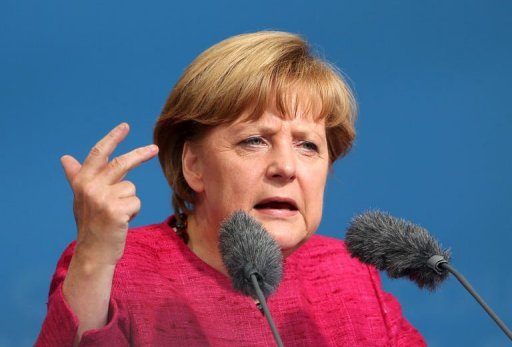German Chancellor Angela Merkel chose a picturesque small town to launch into full campaign mode for an election in which she is seen likely to stay at the helm of Europe’s biggest economy.
Speaking in the old town square of Seligenstadt near Frankfurt late Wednesday, the woman affectionately dubbed “Mutti” or mum by some made the case that her conservative government is the most successful since reunification in 1990.
Undeterred by some hecklers, she pointed at achievements in health, education and aged care as she kicked off a whirlwind campaign tour that will see her speak at 56 events in 40 days.
In the enthusiastic crowd of about 1,000 supporters, many waved signs saying “Angie”.
Merkel, despised in parts of crisis-hit Europe for insisting on tough austerity, is popular in Germany where many see her as a responsible guardian of the public purse.
Pushing her message of fiscal discipline, Merkel told the crowd: “We have seen in Europe what happens when debts are too high. Growth on borrowed money — that’s impossible.”
The launch ahead of the September 22 vote came as new data showed the German economy grew 0.7 percent in the second quarter, helping propel the eurozone out of its stubborn recession.
To many observers, calm and pragmatic Merkel, 59, Forbes magazine’s most powerful woman in the world, seems an immovable force, and few can imagine she will not stay in power.
Niedermayer said that in Germany, where the jobless rate is 6.8 percent, the eurozone crisis seems like an abstract threat to many, and that “the citizens believe she has steered Germany through the crisis”.
Merkel’s personal popularity lead over her top challenger Peer Steinbrueck of the Social Democratic Party (SPD) has narrowed a few points but remains huge at 54-23 percent, said the latest Forsa institute survey.
The Forsa poll also gave Merkel’s Christian Democrats (CDU) and its Bavarian sister party a 40-23 percent lead over the SPD, and 13 percent for the Social Democrats’ campaign ally the Greens.
This would mean that Merkel’s party, together with its junior partner the pro-business Free Democrats (FDP), which scored five percent, would have a narrow governing majority.
However, if the FDP drops below five percent, it would fail to enter parliament, a fate also signalled by the poll for a small anti-euro party and the Internet-freedom Pirates.
Such a result would force Merkel to seek new allies — either the Greens, seen as a long shot, or the SPD, with whom she previously ruled in a ‘grand coalition’ in her first term.
Merkel has already adopted many centre-left policies, on issues from renewable energy to gay marriage, to gain the political centre, depriving her rivals of issues to attack her on.
Steinbrueck, 66, has so far had a luckless campaign, hobbled by gaffes. This week he apologised for saying Merkel’s upbringing in communist East Germany made her a less enthusiastic European, comments that offended voters in eastern states.
Niedermayer said the SPD is failing to gain traction with its “core brand” issue of social justice. On many other issues the two major parties largely agree, like how to tackle the eurozone crisis, where the opposition has substantially backed the government.
But while Merkel is the favourite to win, Niedermayer said, the question is what coalition she will be forced into, as small changes could dramatically change the picture.

COMMENTS
Please let us know if you're having issues with commenting.